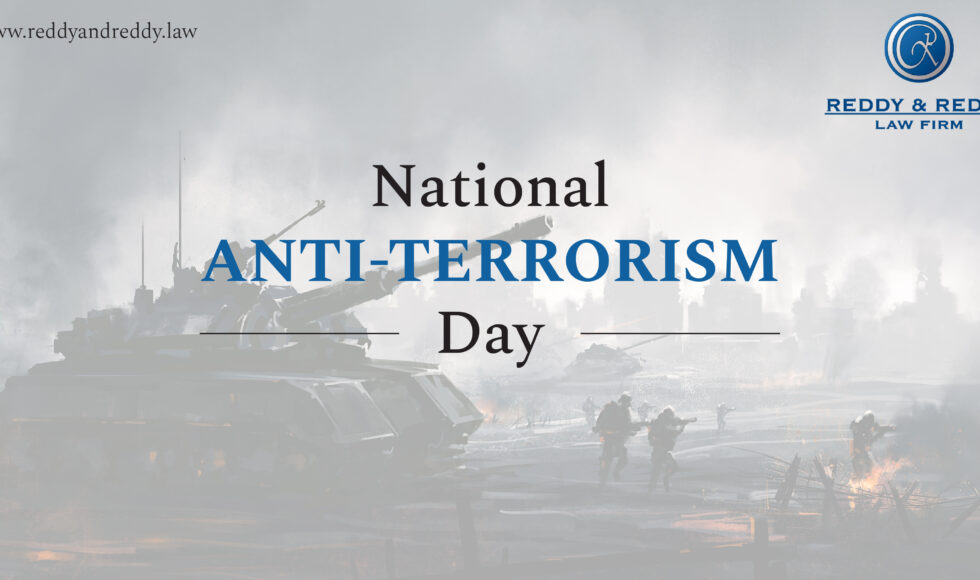Introduction
National Anti-Terrorism Day in India serves as a reminder of the nation’s commitment to combat terrorism and uphold the safety of its citizens. In this blog, we delve into the legal landscape of counter-terrorism in India, focusing on key legislations such as the Unlawful Activities (Prevention) Act (UAPA) and the National Investigation Agency Act (NIA Act). These laws serve as pillars in the fight against terrorism, empowering law enforcement agencies to effectively address threats to national security.
Unlawful Activities (Prevention) Act (UAPA)
The Unlawful Activities (Prevention) Act, enacted in 1967 and amended over the years, is significant legislation aimed at preventing unlawful activities that pose a threat to the sovereignty and integrity of India. Its primary objective is to combat terrorism and its manifestations by providing law enforcement agencies with comprehensive tools to investigate, prosecute, and prevent terrorist activities.
Key Provisions and Empowerment:
- Designation of Organizations and Individuals: The UAPA enables the government to designate organizations and individuals as “terrorist” entities, thereby allowing for stringent measures against them. This provision serves as a deterrent to terrorist organizations and aids in dismantling their networks.
- Preventive Detention: The Act empowers authorities to detain individuals suspected of engaging in terrorist activities or supporting such activities. This provision allows law enforcement agencies to intervene proactively to prevent potential threats to national security.
- Asset Freezing and Seizure: Under the UAPA, authorities have the authority to freeze and seize assets linked to terrorist activities. This measure cripples the financial resources of terrorist organisations, hindering their ability to carry out nefarious acts.
Relevant Landmark Cases:
- State of Maharashtra v. Mohammed Ajmal Mohammad Amir Kasab: This landmark case pertains to the 2008 Mumbai attacks, wherein the lone surviving perpetrator, Ajmal Kasab, was prosecuted under the UAPA. The case underscored the importance of robust anti-terrorism laws in effectively combating such heinous acts.
- People’s Union for Civil Liberties (PUCL) v. Union of India: In this case, the Supreme Court of India upheld the constitutional validity of certain provisions of the UAPA, while also emphasizing the need to balance national security concerns with fundamental rights. National Investigation Agency Act (NIA Act): The National Investigation Agency Act, enacted in 2008, established the National Investigation Agency (NIA) as a specialized agency to combat terrorism and other related crimes on a national scale. The NIA Act complements existing anti-terrorism laws by providing a dedicated agency with enhanced investigative powers and jurisdiction.
Key Provisions and Empowerment:
- Jurisdiction and Investigative Powers: The NIA Act grants the agency jurisdiction over offences committed anywhere in India, thereby facilitating seamless coordination in counter-terrorism efforts. Moreover, the NIA has extensive investigative powers, including the authority to arrest, search, and seize evidence.
- Special Courts: The Act provides for the establishment of special courts for the speedy trial of offences under its purview. This ensures expeditious justice and reinforces the deterrence factor against terrorist activities.
- International Cooperation: The NIA Act enables the agency to cooperate with foreign agencies and governments in matters relating to terrorism and transnational crimes. This fosters international collaboration in combating the global menace of terrorism.
Relevant Landmark Cases:
- Ajmer Dargah Blast Case: The NIA played a pivotal role in investigating the 2007 Ajmer Dargah blast case, wherein several individuals were prosecuted for their involvement in the terrorist attack. The successful prosecution highlighted the efficacy of the NIA in addressing such cases.
- Pulwama Attack Case: Following the deadly Pulwama attack in 2019, the NIA undertook a thorough investigation, leading to the identification and prosecution of individuals involved in the planning and execution of the attack. The case exemplifies the NIA’s proactive approach in tackling acts of terrorism.
Conclusion
On National Anti-Terrorism Day, it is imperative to recognize the crucial role of anti-terrorism laws such as the UAPA and the NIA Act in safeguarding India’s security and sovereignty. These legislations empower law enforcement agencies to effectively combat terrorism and ensure justice for victims of terrorist acts. As the legal landscape evolves to counter emerging threats, continued vigilance and robust legal frameworks remain indispensable in the nation’s ongoing fight against terrorism.

